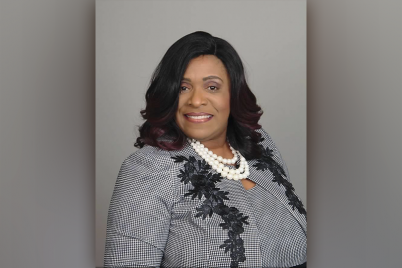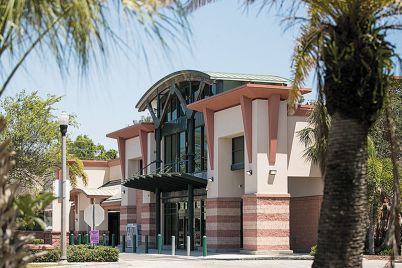Scott Darius, executive director at Florida Voices for Health and Anne Swerlick, senior policy analyst at Florida Policy Institute
BY FRANK DROUZAS, Staff Writer
ST. PETERSBURG — Foundation for a Healthy St. Petersburg (FHSP) held its first Pinellas Race Equity Leadership Council Issue Lab to discuss the recent Florida legislative session results. Speakers Scott Darius, executive director at Florida Voices for Health, a statewide healthcare advocacy organization, and Anne Swerlick, senior policy analyst at Florida Policy Institute, explained the effects of these new laws on the Black community.
“The purpose of these issue labs is really to give us a quick opportunity for a dive into topics or topic that show us interest as a leadership group trying to understand how race equity can be improved,” said Randy Russell, founding president and CEO of FHSP, “and we can close the race equity gap here in Pinellas County.”
Darius noted that more than 700,000 people enrolled in Medicaid during the pandemic, and while Medicaid was able to take care of most, there were still people who were left out of the system.
“As a health advocacy organization, we really see expanding access to healthcare as being critical to addressing the disparities that currently exist for communities of color.”
More than 30 percent of direct medical costs for people of color can be tied to health inequities, he said, and about five in 10 Floridians who could get coverage through Medicaid expansion are people of color – 29 percent Hispanic and 22 percent African American.
Concerning the new legislation, the biggest win for health equity was the extension for postpartum coverage for women enrolled in Medicaid. Before the session, women who qualified due to pregnancy lose their coverage 60 days after the pregnancy ends.
“I think we all know that the hard work of pregnancy and motherhood really doesn’t fade away in two months,” Darius said, adding that when the new change takes effect in July, it will extend the period of Medicaid for postpartum women to 365 days.
A bill filed by Sen. Darryl Rouson and Rep. Kamia Brown will require each county to have a dedicated minority health liaison to ensure health equity across the state. The liaison would be responsible for making sure counties are implementing statewide policies relating to health equity.
The bill will also require the Florida Office of Minority Health and Health Equity to coordinate with established health liaisons and county-level health departments to address disparities. The office will gather data and publish reports on health equity at the state and county levels. It will also identify areas in need of improvement.
Other 2021 passed bills concerning healthcare include SB 348/HB 461 Medicare Transportation Services, which expands the types of emergency transportation vehicle services provided to Medicare-eligible persons that Medicaid will pay for; and SB 1024/HB 701 Increasing Access to Mental Health Care, which requires DFS to establish a system for tracking complaints made regarding coverage and access to mental health services.
Some of the bills not passed concerning Medicaid expansion include SJR 276, which would’ve put expansion on the 2022 ballot — the bill needed three-fifths majority vote in each chamber to pass.
“Expanding Medicaid would save us nearly $200 million a year by cutting out some of the other patchwork healthcare programs that we have,” Darius said.
Another missed opportunity was HB 899/SB 1272, which would’ve required the state to disaggregate or break down MCO (managed care plan) performance measure data based on race, ethnicity, disability, and other demographics. The bill, filed by Rep. Bartleman and Sen. Rodriguez, stalled in committee.
Among the more controversial bills passed, HB 1, officially known as “The Combating Violence, Disorder, and Looting and Law Enforcement Protection Act,” expands who can be charged as a felon during protests and gives law enforcement broader arresting powers.
It also makes it harder for local governing bodies to adjust police budgets.
Another is SB 90, which restricts dropbox use to a county’s early voting hours rather than allowing ballots to be dropped off 24 hours a day. It also makes in-person monitoring of all dropbox locations mandatory.
“Additionally, voters have to request their vote-by-mail ballots every election cycle as opposed to every two cycles,” Darius said.
Another passed piece of legislation, HB 7051, dealt with law enforcement changes. It requires the Criminal Justice Standards and Training Commission to develop instruction and basic training standards for law enforcement officers on policies regarding use of force, such as proportional use of force, alternatives to use of force, de-escalation techniques and limiting the use of chokeholds, and an officer’s duty to intervene if they see another officer using or attempting to use excessive force.
Further, it uniformly requires independent reviews of deadly use of force incidents and officer-involved shootings resulting in death or injuries across the state. This means a law enforcement agency cannot conduct a review involving one of its employees but instead must hand the review or investigation to another agency.
A broad-based tax relief package that expands the tax credit for affordable housing, among other things, was also passed.
“We know affordable housing is a problem across the state, including in the Tampa Bay area,” Darius said, “and while there’s a lot more action Florida could’ve taken to directly address some of these issues, we’ve at least taken a step on the supply side of things by expanding a tax credit available to folks who build affordable housing.”
Swerlick explained that the budget the state legislature develops is the primary documentation of how their values translate into health and human services investments and other priority investments for the state. Policy choices are also reflected in state program investments and can help dismantle persistent racial inequities.
The state’s investment in public services is extremely low compared to the rest of the country.
“We don’t have an overspending problem, which is what we frequently hear during session, we have a revenue problem, and Florida’s tax and revenue policies are really at the core of solutions to reverse this long history of underinvestment,” Swerlcik said.
As Florida’s history of underinvestment in public services is linked to revenue and tax policies, undoing inequities will require substantial, sustained state investments in education, health, and well-being of long-neglected communities. The state’s overreliance on sales tax for revenue puts an inequitable tax burden on low-income communities and people of color.
“There’s a lot of boasting that Florida is a low-tax state,” she said, “but really, we have a very upside-down tax system where it’s a very high tax state for the poor, and people of color pay a larger share of their income on taxes.”
There are opportunities to advance anti-racist and equitable policies, including ending driver’s license suspension for criminal fines and fees that are not driving-related offenses; fixing the unemployment compensation system and enforcing minimum wage laws; expanding Medicaid; and collecting, analyzing, and publishing stratified demographic data on programs in which the state already invests.
Florida’s clerks are primarily funded by fines and fees from criminal and civil traffic citations, and to enforce collection of fines and fees, clerks rely on driver’s license suspension.
“Aside from this being a very unstable, unreliable means of funding, the enforcement mechanisms — driver’s license suspensions — are not only ineffective, but they disproportionately hurt people of color and low-income communities.”
For the people who do not have the means to pay, driver’s license suspensions do not yield compliance, and suspension rates are higher in impoverished areas and communities with a large population of Black and Brown Floridians. As an alternative source of funds, FPI recommendations include reforming the clerks of courts’ budget model to draw from an alternative source of funding that is independent of fines and fees collections; eliminating driver’s license suspension for unpaid civil and criminal traffic citations, and allowing clerks to waive, modify, or convert outstanding fines and fees to community service, and implementing standardized payment plan options across counties.
Florida’s unemployment rate for Black workers is 50 percent higher than the state average for white workers, but Black and Latino workers who apply for unemployment benefits are less likely than white applicants to receive assistance. Additionally, immigrants, people of color, and women in Florida are more likely to experience wage theft — where employers fail to pay employees the minimum wage — in Florida.
“Latino women are nearly two and a half times more likely to be victims of wage theft compared to white women,” Swerlick said, “and for Black women, it’s two times more likely.”
FPI policy recommendations include reintroducing a state Department of Labor to provide the authority and resources necessary to ensure working Floridians are paid the wages to which they’re entitled, she said.
To reach Frank Drouzas, email fdrouzas@theweeklychallenger.com








